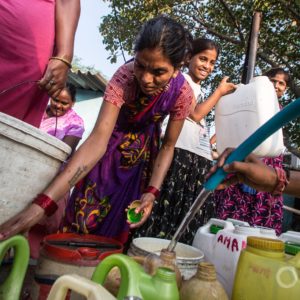The Stream, July 13: Billions of People Still Lack Adequate Sanitation and Water
The Global Rundown
More than half of the world’s population lacks access to adequate sanitation, a new report found. Providing insurance in low-income countries could cut the cost of natural disasters and reduce the need for aid. Excessive distribution losses and the mismanagement of resources are hampering efforts to provide reliable water in New Delhi. A massive iceberg broke off from Antarctica, though scientists don’t expect it will create significant sea level rise. Rising seas in Australia are putting island communities at risk. A major natural gas pipeline in the United States continues to face hurdles after the project spilled drilling fluid into wetlands in Ohio.
“Long term, we may have to evacuate the island. But I am not going. Slowly, I see Masig Island getting out of something I can control.” –Songhi Billy, an engineering officer on Masig Island in Australia, where rising sea levels are putting island and coastal communities at much higher risk of floods. (Guardian)
By The Numbers
4.5 billion people Number globally who lack access to adequate sanitation, double the number who lack access to clean water, according to a report released by the World Health Organization and UNICEF. Newsweek
In context: Billions lack safe drinking water and sanitation at home.
40 percent Estimated water losses from New Delhi’s distribution system last year. Coupled with management problems, the losses contribute to a chronic struggle to provide a reliable water supply to city residents. Quartz
6,000 square kilometers Area of a massive iceberg that broke off from Antarctica over the past few days, removing more than 10 percent of the Larsen C ice shelf. Associated Press
Science, Studies, And Reports
Droughts, floods, and other natural disasters have cost the world’s poorest countries an average of $29.1 billion each year over the past 15 years, according to a report commissioned by Britain’s Department for International Development. Only 3 percent of the cost has been covered by insurance, but the report suggests that increasing coverage could help reduce funding shortages for natural disaster response and aid. Reuters
On The Radar
The U.S. Federal Energy Regulatory Commission is asking the company behind the Rover natural gas pipeline to create a plan to clean up drilling fluid that spilled into Ohio wetlands earlier this year. The pipeline is the largest under construction in the United States, but the wetland spill could delay its operation, according to analysts. Reuters
A news correspondent for Circle of Blue based out of Hawaii. She writes The Stream, Circle of Blue’s daily digest of international water news trends. Her interests include food security, ecology and the Great Lakes.
Contact Codi Kozacek




